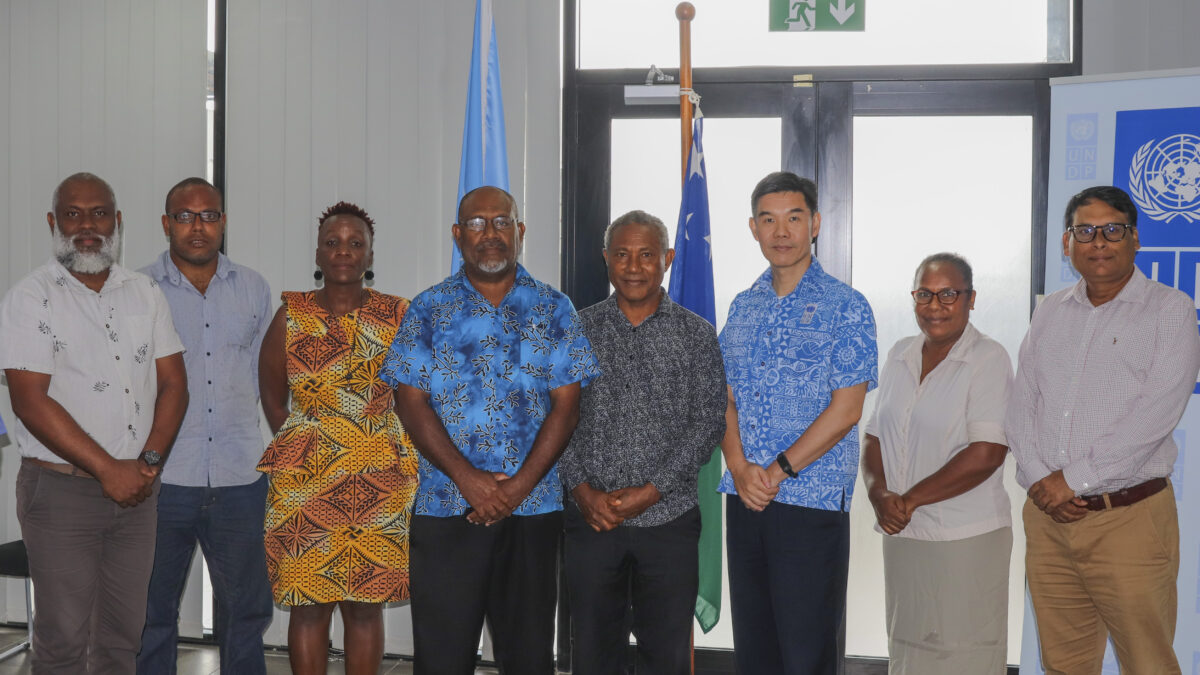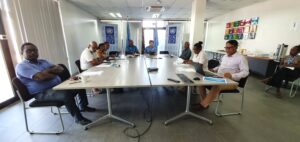

Photo caption - From left to right John Misitee, Deputy Secretary from the MPGIS; Duddley Meloma, UNDP's Monitoring and Evaluation Officer; Abigail Tevera, UNICEF's Wash Specialist; Mr. Stanley Pirione, Permanent Secretary of the Ministry of Provincial Governments and Institutional Strengthening (MPGIS); Dr. Franco Rodie, Permanent Secretary of the Ministry of Education and Human Development (MEHD); UNDP's Officer in Charge, Mr. Patrick Pee; Margret Moveni, Deputy Secretary Corporate from Ministry of Finance and Treasury (MOFT); and Mozammel Haque, UNDP's PGSD Programme Manager.
Solomon Islands to accelerate Provincial Service Delivery under the Provincial Governance and Service Delivery Project
Honiara, September 19 – The Solomon Islands Provincial Governance and Service Delivery (PGSD) project reaches a milestone at the First Board Meeting. The project sets the stage for a transformative journey towards bolstering provincial governance, strengthening service provision, and fostering inclusive development in the Solomon Islands. At a higher level, it aims at accelerating decentralization, promoting effective governance, and achieving the Sustainable Development Goals (SDGs) by prioritizing improved service delivery, including reaching marginalized and remote populations.
Representatives from Ministry of Provincial Governments and Institutional Strengthening (MPGIS), the Ministry of Education and Human Development (MEHD), the Ministry of Health and Medical Services (MHMS), the Ministry of Finance and Treasury (MOFT), the European Union that supports financially, and UNICEF and UNDP as implementing partners have converged to analyze and evaluate project´s progress; identify risks, and how to overcome the challenges that the project is already facing in this initial phase.
The meeting co-chaired by Mr. Stanley Pirione, Permanent Secretary of the Ministry of Provincial Governments and Institutional Strengthening (MPGIS) and UNDP’s Office in Charge, Mr. Patrick Pee, started with the latter emphasizing the importance of this project for Solomon Islands given the sprawling geography of the country:“Strengthening sub-national institutions is an absolute necessity to enable the effective and efficient provision of essential public services to people, particularly marginalised groups in the remotest parts of the country”.
Due to the limited resource flow to the provinces, the weak capacity, and the lack of effective coordination among line ministries and Provincial Governments (PGs), the PGSD Project aims at improving service delivery to the community. The Government’s initiative towards decentralization and developing a unified provincial administration is showing to be very slow in its reform initiative; hence, it’s missing the opportunity of delivering services to the remotest parts of the country, leaving Solomon Islands behind in achieving the development goals. Strengthening Provincial Government and Service Delivery Project contributes to goals 3,4,5.6,13, and 16 of the 2030 SDGs Agenda.

Participants during the meeting.
As UNDP’s Programme Manager, Mozammel Haque, exposed during the progress project overview and presentation of the annual work plan, the project’s overall objective is to improve inclusive, transparent, accountable, and institutionally embedded governance systems for effective and decentralized social service delivery, realizing the population’s rights in the nine provinces of Solomon Islands through providing grants support and capacity development assistance to the provincial governments. However, the project in this initial phase is facing some challenges to disperse its designed support to all 9 provinces, becoming one of the most intense discussions of this first board meeting.
Mr. Francesco Ponzoni, European Union (EU) Programme Manager, made clear the view of the EU on the challenge, emphasizing that “the project needs, by all means, to support as many provincial governments and spread the targeted essential services by the project – education and health – to as many population as possible trusting the capacity of UNDP and UNICEF in Solomon Islands to fulfil the task and support and capacitate the whole process and all the concerned institutions.”
Mr. Stanley Pirione, Permanent Secretary of the Ministry of Provincial Governments and Institutional Strengthening (MPGIS), in his remarks thanked UNDP and the project team’s commitment and highlighted “the importance of the meeting where all the issues and challenges ahead of the project have been underlined and how better we can work together on the way forward. This is the beginning of the project, and we still have much work to do to meet the outcomes of the project.” He ended by reflecting on the overall approach of the project: “After all this fruitful discussion, we will have to review the different approaches and the implementation modality of how this project was initially conceived to maximize the meaningful impact it aims to make.”
The meeting has also been an opportunity for all partners to converge and decide the projects priorities for the year 2024.
UNDP is the leading United Nations organization fighting to end the injustice of poverty, inequality, and climate change. Working with our broad network of experts and partners in 170 countries, we help nations to build integrated, lasting solutions for people and planet. Learn more at www.pacific.undp.org or follow us on social at @UNDP_Pacific and @UNDP_Solomons.
UNDP Press